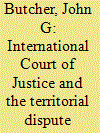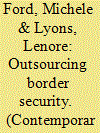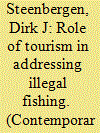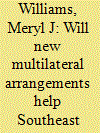|
|
|
Sort Order |
|
|
|
Items / Page
|
|
|
|
|
|
|
| Srl | Item |
| 1 |
ID:
121880


|
|
|
|
|
| Publication |
2013.
|
| Summary/Abstract |
In the early 1990s Indonesia and Malaysia were locked in a long-running and bitter dispute over the ownership of two tiny islands in the Sulawesi Sea and the associated question of maritime boundaries in this area rich in oil and gas deposits. Neither government had ever referred a dispute with another state to the International Court of Justice but in 1996 President Soeharto agreed to Malaysia's proposal to ask the ICJ to issue a ruling on the dispute between the two countries. In 1998 Indonesia and Malaysia asked the ICJ to rule on the ownership of the islands. They did not, however, ask it to rule on the far more important question of their maritime boundaries in the Sulawesi Sea. The ICJ's judgement in 2002 that the islands belonged to Malaysia therefore left that question unresolved. The article argues that because of Indonesia's experience with the ICJ and the high stakes involved for both countries any resolution of the boundary dispute - which came close to open conflict in 2005 - will almost certainly be the result of state-to-state negotiations rather than a ruling by the ICJ or any outside body.
|
|
|
|
|
|
|
|
|
|
|
|
|
|
|
|
| 2 |
ID:
121877


|
|
|
|
|
| Publication |
2013.
|
| Summary/Abstract |
This article explores the involvement of a range of diverse for-profit actors in providing port and border security in Indonesia. Using the port of Belawan, Medan, as a case study, the article demonstrates the critical, albeit controversial, role that private security providers play in security governance in Indonesia. After a discussion of port security and the notion of ports as borders, the paper provides an overview of the large number of state and non-state actors involved in providing security in the port of Belawan. Among the for-profit actors are guards hired by the state-owned port operator Pelindo I; Private Military and Security Companies (PMSCs) with links to the Indonesian military; and members of Pemuda Pancasila (PP), known to be involved in illegal activities in the port they help secure. The article argues that while some private actors do contribute to port security, the involvement of so many different types of state and non-state agencies has actually lessened security in Belawan. This is in part due to the nature of some of the agents involved - particularly the members of PP - and the problematic relationship and lack of cooperation between the different state and non-state actors.
|
|
|
|
|
|
|
|
|
|
|
|
|
|
|
|
| 3 |
ID:
121876


|
|
|
|
|
| Publication |
2013.
|
| Summary/Abstract |
Contemporary maritime security threats such as piracy, smuggling and illegal fishing are major concerns in Southeast Asia. responding to these threats have long been seen as the responsibility of governments. This article demonstrates how new actors have become involved in addressing national and regional maritime security threats in Southeast Asia. Focussing on three distinct types of new actors - for-profit actors, not-for-profit actors and multilateral institutions - the article provides an understanding of the (sometimes controversial) nature of their responses to threats and the relationships between these new actors and the state. By revealing the contribution made by new actors in Southeast Asia - a region where governments are particularly protective of their sovereignty - this article shows how and why established patterns of security governance in Southeast Asia are changing and offers new insights into alternative methods for tackling maritime security threats.
|
|
|
|
|
|
|
|
|
|
|
|
|
|
|
|
| 4 |
ID:
121879


|
|
|
|
|
| Publication |
2013.
|
| Summary/Abstract |
Since the signing of the United Nations Convention against Trans-national Organized Crime, the Straits of Malacca have been identified as a "hot spot" for whole range of maritime security threats, including human trafficking and people smuggling. As a consequence, Indonesia's national and local authorities have been under immense pressure from the international community to develop and implement programmes that address these concerns. Multilateral agencies and other donor organizations have also pumped millions of dollars into counter-trafficking and anti-smuggling programmes in the Riau Islands. Much of the groundwork for both government and international initiatives is done by NGOs, most of which work to identify and assist repatriated migrant workers or victims of trafficking. In one case, however, a Batam-based NGO has gone far beyond this well-trodden path, developing a system to apprehend undocumented labour migrants who use the services of people smugglers to return to Indonesia without passing through immigration. This article examines the case of Gerakan Anti-Trafficking (Anti-Trafficking Movement, GAT) and its implications for our understanding of emerging modes of non-state involvement in border regulation.
|
|
|
|
|
|
|
|
|
|
|
|
|
|
|
|
| 5 |
ID:
121878


|
|
|
|
|
| Publication |
2013.
|
| Summary/Abstract |
Tackling illegal fishing through traditional state-centred approaches has proven difficult and largely ineffective in the extensive maritime environment of Southeast Asia, and particularly in the archipelagic state of Indonesia. This article focuses on the involvement of a new for-profit actor - a private tourism dive operator - in addressing illegal fishing in a small island archipelago in eastern Indonesia. The case study demonstrates that the dive operator has been able to employ conventional enforcement methods such as patrolling and the capture of illegal fishers, in combination with alternative approaches to addressing the root causes of illegal fishing. It also explores the relationship of the dive operator with civil society actors, non-governmental organizations (NGOs) and various state agencies involved in maritime security and conservation governance in the area. With a particular focus on the dive operator's relationship with government agencies, the case study shows that local governments are collaborating with private actors and providing opportunities for new kinds of enforcement agents since they themselves lack sufficient resources to patrol waters effectively. The dive operator, however, operates only within a space granted by the district government, and must invest considerably in this relationship to maintain his position.
|
|
|
|
|
|
|
|
|
|
|
|
|
|
|
|
| 6 |
ID:
121881


|
|
|
|
|
| Publication |
2013.
|
| Summary/Abstract |
Illegal cross-border fishing is an important maritime security issue in Southeast Asia. Southeast Asian states, along with other states with interests in the region, have created three new multilateral fisheries-relevant arrangements of agencies with overlapping but different memberships: the Regional Program of Action on Illegal, Unreported and Unregulated (IUU) Fishing; the ASEAN-Southeast Asia Fisheries Development Center Strategic Partnership; and the Coral Triangle Initiative. Each of these multilateral arrangements has the potential to help Southeast Asian states deal with fisheries-based security issues more effectively by building polycentric coalitions and capacity. So far, however, they have had a limited impact. This is partly because they are still principally technical support bodies rather than management organizations. In addition, states need to make greater strides towards settling outstanding border disputes and address fisheries overcapacity and overfishing in waters under their jurisdiction. States are unable to address these problems adequately because the fishery sector is typically low in national priority. Moreover, national interest in fisheries remains concentrated on immediate food and economic needs, and, in international relations, on jurisdictional rights.
|
|
|
|
|
|
|
|
|
|
|
|
|
|
|
|
|
|
|
|
|